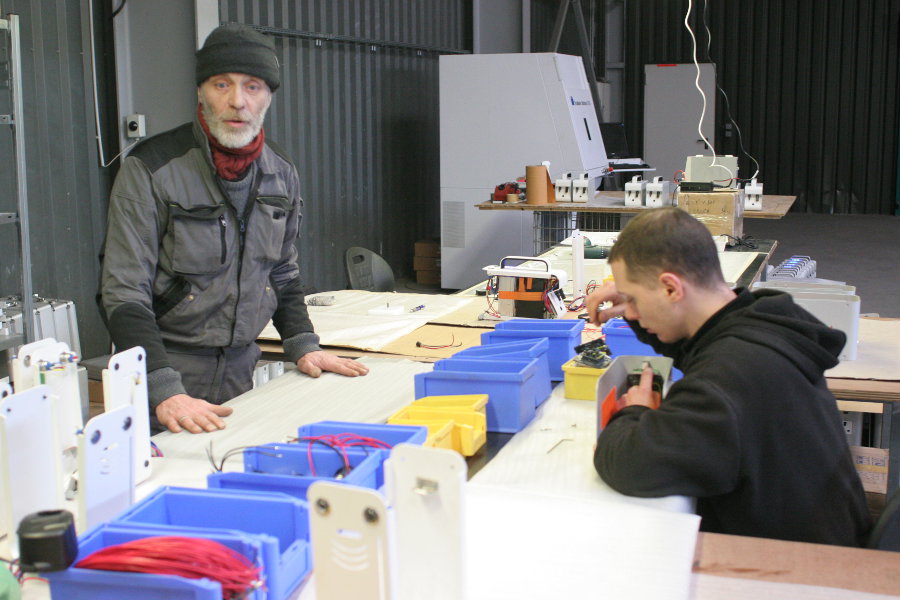April 23, 2012


SAINTE-MARIE-AUX-MINES, FRANCE — Thousandsuns France bundles an environmentally friendly solar product with corporate social responsibility by hiring exclusively disabled personnel to produce its products. What’s more, the company was awarded the Franco-British award for innovation in its first year of production. When everyone benefits, from production staff to top managers to society as a whole, all is well under the sun. (Photo by Arnaud Gailleurd)
[nggallery id=173 template=carousel images=8][imagebrowser id=173]
By Susanne Green April 23, 2012
SAINTE-MARIE-AUX-MINES, FRANCE — Sometimes things turn out the way they are supposed to, and we at Sierra Club Green Home cannot help but notice. In this case, it is one solar company that is powered in equal parts by sustainability and social responsibility.
When Jean Viry-Babel, co-founder of Thousandsuns, had the concept to design a power source for the electricity-free beach houses that scatter the shores of England, he did not know it would lead to providing high-efficiency portable solar generators and panels used worldwide for disaster and recovery purposes, in addition to recreation.
Then it just so happened that ESAT (Etablissement ou Service d’Aide par le Travail) Les Tournesols, a French nonprofit that helps disabled people find work, was located in the vicinity of Thousandsuns’ factory in Alsace, France. When a company hires disabled workers in France, most of its employee wage taxes are waived, amounting to a savings of approximately 35% of the wage, according to Viry-Babel. So it seemed like a practical investment.
Thousandsuns France contacted ESAT in 2011 regarding hiring its production personnel through ESAT’s agency. Since production began in June 2011, disabled persons staffed through ESAT have assembled all of Thousandsuns’ Solarpods, a revolutionary product that in 2011 earned Thousandsuns the Franco-British Award for Innovation. The Solarpod ranges in size from the “Buddy,” a small device with enough power to recharge a cell phone, to the “Pro,” a larger 1,000 watt unit, which weighs about 33 pounds.
Some might call it serendipity, but when asked about how everything fell into place, Viry-Babel says, “That’s the whole point, the normality of it.”
Are there any special challenges to hiring exclusively disabled personnel? Viry- Babel says that the instructions for assembly are all visual, and his production staff perfoms well and reliably.
“I have more difficulties with our non-disabled employees,” he says.
Disabilities among employees range from deafness and severe depression to Autism or Down syndrome. However, Thousandsuns France cannot hire individuals in wheelchairs because assembly on most products requires the employee to be standing.
Thousandsuns has adopted the strategic model of many major French companies (particularly in the environment and energy sectors): contributing to the challenges of sustainable development through corporate social responsibility (CSR). The goal is to collaborate with particular institutions and services to invest in human capital and promote corporate social responsibility. CSR often goes hand-in-hand with increasing a company’s bottom line.
Viry-Babel states that his company doesn’t broadcast its CSR strategy. However, distributors of Solarpod do market the product as a “bundled” socially responsible product. Extending beyond Thousandsuns’ hiring policy, the Solarpod is 98% recyclable, is nearly carbon neutral, and proudly wears the stamp “Made in France,” where there is relatively strong labor advocacy. And, of course, it’s solar.
But investing in human capital is about much more than profits or earning a “socially responsible” stamp. It can make a difference in the life of a person who may otherwise experience difficulty finding gainful employment.
Let us consider François, who began working at Thousandsuns France when it opened its doors for production last June. François began working at age 15. However, after experiencing severe lower back pain and social difficulties, followed by a period of drug addiction, finding employment was a problem for him.
“My back problems in addition to the scars left by the addiction to drugs did not permit me to resume any work,” says François. After 12 years of experience at ESAT, François was sent to Thousandsuns to complete two weeks of training under production manager Arnaud Gailleurd.
In less than one year François has participated in the completion of more than 2,000 Solarpods and is now supervisor of two other disabled employees. “I thank [Thousandsuns] for giving me this chance and today entrusting me with so much responsibility,” says François.
It looks like this model is making a difference one person at a time at companies like Thousandsuns. Sierra Club Green Home applauds this company’s successful melding of sustainability and social justice.
For related articles, please see: Los Angeles Youth Plant Seeds of Sustainbility and Social Justice Clean, Renewable Energy Could Power U.S. by 2050
Susanne Green is a freelance writer who enjoys writing about green homes, purple hearts, and white elephants. She is a finance professional who has travelled on foot through varied countries on six continents and now lives with her daughter in Southern California.
© 2012 SCGH, LLC.
]]>